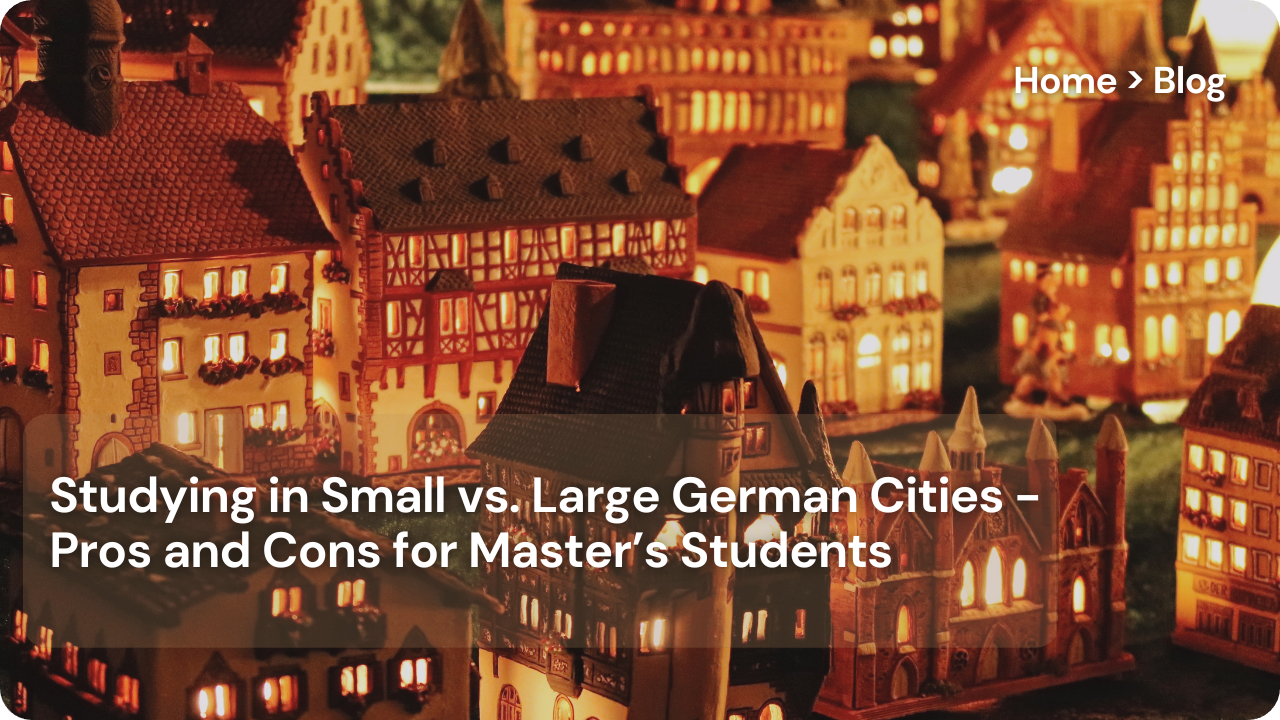There are no items in your cart
Add More
Add More
| Item Details | Price | ||
|---|---|---|---|
 Studying in Small vs. Large German Cities - Pros and Cons for Master’s Students
Studying in Small vs. Large German Cities - Pros and Cons for Master’s StudentsChoosing where to pursue a Master’s degree in Germany involves weighing the benefits of studying in small versus large cities. Each offers distinct advantages and challenges, impacting lifestyle, costs, and academic experiences for international students.
Advantages of Large Cities
Large cities like Berlin, Munich, and Hamburg are vibrant hubs of culture and opportunity. They host top-tier universities, such as Humboldt University or the Technical University of Munich, offering diverse Master’s programs, especially in fields like engineering and business. These cities provide extensive networking opportunities through industry events, career fairs, and internships with global companies like Siemens or BMW. The multicultural environment fosters integration, with English widely spoken and international communities thriving. Students enjoy rich cultural scenes, from Berlin’s nightlife to Munich’s Oktoberfest, enhancing the overall experience. Public transportation is efficient, making commuting to campus or part-time jobs seamless.
Drawbacks of Large Cities
However, large cities come with their own set of challenges. The cost of living is higher, with Munich’s rent averaging €800–€1,200 monthly for a single room, compared to smaller cities. Competition for housing is fierce, often requiring months of searching. The fast-paced urban life can feel overwhelming, especially for students adjusting to a new country. Additionally, crowded campuses may mean less personalized attention from professors, which can impact academic support for Master’s students working on complex theses.
Benefits of Small Cities
Smaller cities, such as Freiburg, Göttingen, or Darmstadt, offer a more intimate academic environment. Universities like the University of Freiburg offer excellent Master’s programs, often featuring closer student-teacher interactions, which are ideal for research-focused students. Living costs are lower, with rents often ranging from €400 - €700. These cities offer a relaxed pace, green surroundings, and a tight-knit student community, fostering a sense of belonging. International students may find it easier to integrate into the local culture, as smaller cities often encourage German language practice, thereby enhancing their employability.
Challenges of Small Cities
On the downside, smaller cities may have fewer industry connections, which limits internship and job opportunities compared to urban hubs. Cultural and entertainment options are less diverse, which might feel restrictive for students seeking a vibrant social scene. Public transportation is less extensive, and some universities offer fewer English-taught Master’s programs, requiring stronger proficiency in German. Access to international communities may also be limited, potentially leading to feelings of isolation.
Making the Right Choice
The choice between small and large cities depends on priorities. Large cities suit those seeking dynamic career networks and cultural diversity, but require higher budgets and adaptability. Smaller cities are ideal for focused studies, affordability, and cultural immersion, but may lack exposure to industry. Researching university programs, visiting campuses, and assessing personal preferences for lifestyle and career goals are crucial steps.
To wrap up, small or big, both settings offer unique pathways to a rewarding Master’s experience in Germany, aligning with diverse academic and personal aspirations. To learn in-depth about the cities, you can download our free city guide.